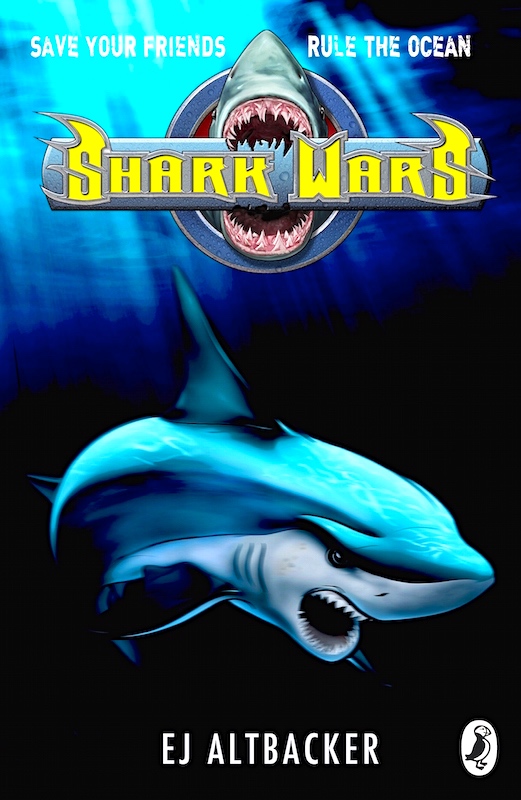Just when you thought it was safe to go back in the water —
it was Shark Week again, and Findependence Day!
(This year’s programs premiered on the Discovery Channel on the eight days from July 5th through the 12th, yesterday, but re-runs will continue for a while.)
The portmanteau findependence combines fin (as in shark fin) and independence (as in Independence Day). In another context, it’s been used to stand for financial independence.
Now, on Shark Week. From Wikipedia:
Shark Week is an annual, week-long programming block created by the Discovery Channel which features shark-based programming, real and fictional. Shark Week originally premiered on July 17, 1988. Held annually, normally in July or August, it was originally developed to raise awareness and respect for sharks. Over time it grew in popularity and became a hit on the Discovery Channel. Since 2010, it has been the longest-running cable television programming event in history. Now broadcast in over 72 countries, Shark Week is promoted heavily via social networks like Facebook and Twitter.
… the program Megalodon: The Monster Shark Lives [in 2013] … became one of the most watched programs in Shark Week history, primarily for the controversy and backlash it generated. The mockumentary was based on an ancient giant shark called megalodon, which is now long extinct. The airing of this program fueled an uproar by viewers and by the science and science-loving community. It eventually started a Discovery Channel boycott. Since then Discovery has increasingly come under fire for using junk science, pushing dubious theories, creating fake stories and misleading scientists as to the nature of the documentary being produced.
Shark Week 2015 tilts very strongly to the scientific.
I am a great fan of Monster Creature movies, as well as programs about real science, but I expect the two genres to be easily distinguishable; Megalodon fuzzed them up some, hence the controversy — though I recognized the movie as clearly a Monster Creature flick that used the name of the actual (but long extinct) megalodon as the take-off point for fantasy.
Three of my postings on sharkish matters:
“Odds and ends 8/18/13″ of 8/18/13: #1 on monster portmanteaus, especially from Roger Corman for the SyFy channel (note: not the Discovery Channel): Dinocroc, Supergator, Piranhaconda, Sharktopus, Pteracuda; plus some produced by imitators, Sharknado for instance
“Bunnies run amok” of 7/5/14: on the “natural horror” genre, with nature run amok; link to the Wikipedia list of natural horror movies, which has a very long sublist of shark movies, including the Shark Attack films (featuring genetically enhanced great white sharks)
“Shark!” of 1/24/15: on the fabled sand sharks, land sharks, and snow sharks (in various media — cartoons, tv, movies)
Bonus 1: Shark Wars. And there are books, for example the Shark Wars series by EJ Altbaker (and games based on the books):
Bonus 2: sharkish adjectives. There’s no standard, well-known adjective (like canine or feline) for referring to sharks as a group. In part, this is because of the taxonomic complexities of sharkdom. From Wikipedia:
Sharks belong to the superorder Selachimorpha [or Selachii] in the subclass Elasmobranchii in the class Chondrichthyes. The Elasmobranchii also include rays and skates; the Chondrichthyes also include Chimaeras [cartilaginous fishes in the order Chimaeriformes, known informally as ghost sharks, ratfish, spookfish, or rabbitfishes].
From Selachii, we get selachine or selachian, both of them attested (though not very widely); in some sources, these adjectives take in skates and rays as well as sharks. But these adjectives are the best we’ve got.
The contenders are squaline or squaloid, and pistrine or pistrian. All attested but very sparsely (squaline occurs in the Altbacker books), and they aren’t very satisfying etymologically.
The squal– adjectives go back to Latin squalus ‘a sea fish’, which is way too broad. But there is Italian squalo ‘shark’ (suitably narrowed) and the genus Squalus of dogfish sharks (narrowed still further).
The pistr- adjectives go back to Latin pistris ‘sea-monster’, covering the fearsome creatures whales, sharks, and sawfish, and so also too broad..


